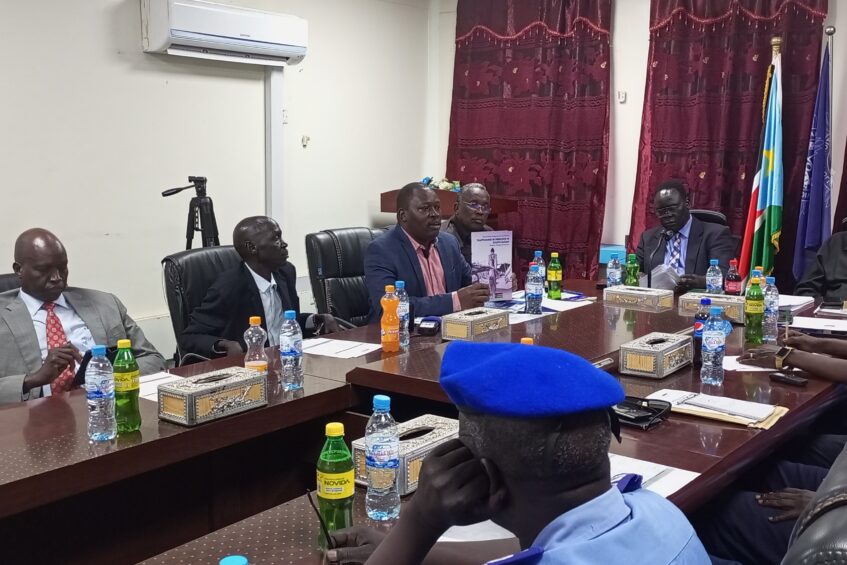
The joint taskforce meeting and the senior leadership of the Ministry of Justice and Interior in Juba on 15th Sept 2022. Credit: Charles Wote/Eye Radio.
The Ministers of Interior and Justice have asked to be given more time before endorsing a proposal seeking South Sudan’s signature on the UN Convention against Transnational Crime and its Protocols.
The convention was adopted by a resolution of the United Nations General Assembly on 15 December 2000, and came into force on 29 September 2003.
So far, 185 UN member-states have signed the Convention, but 9 UN member-states including South Sudan, DR Congo, Somalia, Solomon Islands, Iran, among others are not a party to the document.
Speaking during a meeting of the senior leadership of the Ministry of Justice and that of Interior in Juba last week, Interior Minister General Mahmoud Solomon said they are not okay with some provisions in the document and need more time to study the proposal.
Mahmoud also stated that the government is suspicious of U.S pressuring it into signing the convention.
“This document needs more consultation and decision need to be taken by all the actors. Number two, we cannot leave ourselves to be guided by a country like US, we need to be guided by UN body,” he said.
In December 2019, the Ministry of Interior formed a task-force co-chaired by Inspector-General of Police to advise the government on its obligation to assent to the convention and drafting the country’s necessary laws.
A year later, the task-force conducted a survey in which it found out that the country is vulnerable to human trafficking.
For South Sudan to ratify the treaty, it is required to draft a law that defines Human Trafficking and Smuggling of Persons and the elements of Human Trafficking.
The country also needs to establish a National Anti-human trafficking Bureau and provide harsh punishment for offenders.
“We will give you chance to study the document again and we are going to consult with our colleagues and share out the document so that we have to come out with one language [or] one position since we are deciding on behalf of our people,” General Mahmoud said further.
He added that “it is not an easy thing if we do a slight mistake here, it will be counted for us for centuries.”
However, the Interior Minister did not disclose to the media, the provisions that they are concerned with.
Human trafficking is the recruitment, transportation, transfer, harboring or receipt of people through force, fraud or deception, with the aim of exploiting them for profit.
The vice is prohibited under the Transitional Constitution.
It is also a criminal offense under several national laws such as the Penal Code 2008, Child Act 2008, SPLA act 2011, Anti-money Laundering and Counter Terrorist Finance Act, 2011.
Equally, transnational organized crime (TOC) is said to be posing a significant and growing threat to national and international security, with dire implications for public safety, public health, democratic institutions, and economic stability across the globe.
According to reports, the practice penetrates institutions with corroding corruption and threats to governance in developing countries with weak rule of law.
Countries that ratify the instrument commit themselves to taking measures against transnational organized crime, which include the creation of penalties for domestic criminal offenses such as corruption, money laundering and obstruction of justice.
The task-force appointed by the government in 2019, also found that there were still gaps in the laws to effectively combat human trafficking and smuggling of persons in the country.
It argued that the country’s laws had no stringent punishment, no punishment for aggravated forms of trafficking such as forced labor, trafficking after administering any narcotic during or psychotropic substance or alcohol.
However, it said there was also no space under South Sudan laws for the establishment of National Investigation Bureau at the State and Counties levels on anti-trafficking.
Sabri Wani Ladu, a Senior Legal Counsel and Co-chair of the Taskforce for combating Human Trafficking and Smuggling of Persons explained why it is necessary for South Sudan to ratify the Convention.
“The main issue here is transnational organized crime where we have to put this terms in our laws about transnational organized crime.
“It requires that parties take specific set of measures to facilitate their cooperation mainly to prevent this crime not to happen, to criminalize this crime under the laws of the country, to have the law enforcement have international cooperation.”
Early this week, Police in Northern Bahr el Ghazal State detained four Sudanese and two South Sudanese for allegedly trafficking people out of the country.
The hostages were being taken to Sudan when the police intercepted the traffickers along the border.
According to the U.S. Department of State, South Sudan has not made significant progress in eliminating the human trafficking problem that threatens the country.
Washington says the situation has caused the nation to remain in the Tier 3 category, meaning it does not fully meet the minimum standards for the elimination of trafficking.
Support Eye Radio, the first independent radio broadcaster of news, information & entertainment in South Sudan.
Make a monthly or a one off contribution.
Copyright 2024. All rights reserved. Eye Radio is a product of Eye Media Limited.